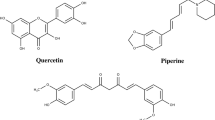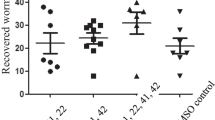Abstract
An arsenite-resistant strain of Leishmania donovani was generated in vitro by sequential exposure to higher concentrations of sodium m-arsenite. The resistant strain displayed a low level of cross-resistance to structurally unrelated drugs such as doxorubicin and pentamidine. This cross-resistance was sensitive to the calcium-channel blocker verapamil. The membrane-associated P-type adenosine triphosphatase (ATPase) activity detected in crude membrane fractions of the resistant strain was 3-fold that found in the wild-type parasites. The enhanced ATPase activity was unaffected by the presence of verapamil in the reaction mixture. However, when cells were grown in the presence of verapamil the membrane-associated ATPase activity of the resistant strain showed significant inhibition.
Similar content being viewed by others
Author information
Authors and Affiliations
Additional information
Received: 6 December 1999 / Accepted: 11 January 2000
Rights and permissions
About this article
Cite this article
Prasad, V., Kaur, J. & Dey, C. Arsenite-resistant Leishmania donovani promastigotes express an enhanced membrane P-type adenosine triphosphatase activity that is sensitive to verapamil treatment. Parasitol Res 86, 661–664 (2000). https://doi.org/10.1007/PL00008548
Issue Date:
DOI: https://doi.org/10.1007/PL00008548




